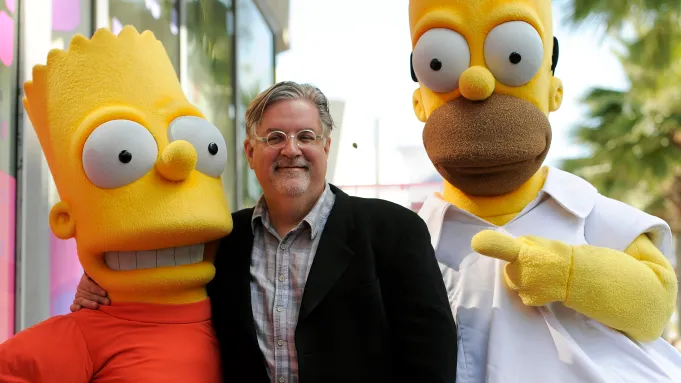This Is College?
San Francisco Chronicle 2000 ©
Classes on popular culture — like hip hop, `Simpsons’ — bursting into academia Tanya Schevitz, Chronicle Staff Writer Tuesday, May 16, 2000
Stanislav Basovich passes a bag of chocolate chip cookies to his students at the University of California at Berkeley, turns on the television and settles in to watch a rerun of “The Simpsons.”
Class is in session.
UC students are hitting the books for finals this week. Those enrolled in “The Simpsons: Sitcom as Political and Social Satire,” are cramming, too. Their final paper is to write an original 22-minute Simpsons episode. A favorable review from Basovich earns them two college credits in history. Some wonder if a class like this is just pandering to couch-potato college students, who instead should be entertained by Euripides or challenged by Chaucer.
But education experts and parents alike say that if it is taught right, a class on popular culture can provide a unique look at political systems, stereotypes and corporate influences on society. Still, it takes some work to prove to tweedy academicians that these classes are legitimate, said Halifu Osumare, a visiting professor from the University of Hawaii, brought to UC Berkeley just to teach some of the subtler aspects of hip hop music and culture in the Department of African American Studies.
Using a 3-inch-thick reader of essays and news articles and the text “Droppin’ Science: Critical Essays on Rap Music and Hip Hop Culture,” Osumare has led her class through an investigation of the history, aesthetics, urban context, economics and institutional policing of hip hop in the United States. For good measure, she also included the globalization of hip hop, which has taken over the youth culture almost everywhere.
“We are talking cutting-edge here. This is an experiment,” she said. “But it contains most of the issues and the theoretical perspectives being taught in the academy today. They understand the models I’m using, that’s why it is accepted.”
In a recent meeting of the class, “Power Moves: Hip Hop Culture and Sociology,” junior Eli Jacobs- Santauzzi flashed slides from Ghana, moving his body smoothly to music from rappers he met during a year studying abroad. At the last class meeting before the final, students busted out rap with disc jockey beats in the background, while others dropped to the ground and threw out a few break- dancing moves. It capped a semester in which students have been visited by “turn-tablists,” heard rap songs by students in the class, debated the changes in hip hop from the early days of the Sugar Hill Gang to today’s Jay Z, and even seen their professor dance.
Classes on cartoon characters and hip hop music may seem a break from tradition at such a prestigious university. But such courses are not limited to the liberal bastion of Berkeley. Across the nation, universities are offering classes on everything from “Madonna as an Icon” to “The Films of Woody Allen, Spike Lee and Martin Scorsese.” Although many universities have been stretching the bounds since the 1960s, higher-education experts say attempts to broaden the scope of academic inquiry have never reached so far into popular culture. Ernst Benjamin, director for the American Association of University Professors in Washington, D.C., said people should not automatically dismiss classes that sound like fluff.
“Don’t judge a book by its cover. There are a lot of serious reasons for teaching a class like that. It is cultural studies,” Benjamin said. “It is like the old jokes about teaching basket weaving. It seems like a joke until you think about what an anthropologist would do with it or what an engineer would do with it.”
A running joke on television can be a serious subject for exploration if professors take the right approach. It could also just be a joke, Benjamin said, but only “if somebody taught it like that.” If students expected to slide through Osumare’s class, they learned quickly that it was not for slackers.
Seniors in the hip hop class can skip the final — if they write a 20-page paper instead. The students had to write two papers, take a 10- page midterm exam and a final exam covering material outlined in a five-page study guide.
“Most people laugh at me and they say, `What do you do, learn how to dance and listen to music?’ ” said senior Jen Johnson, 20. “I was excited that hip hop was finally seen as something that had sociological importance that had a role in forming the political and economic social concepts of urban America.”
Osumare keeps the topic alive with a stream of dance, DJ work, illustrations of graffiti art, videos and audio recordings.
“I wanted to make it like that because the culture is like that,” Osumare said.
Freshman David Spataro, 18, has been listening to hip hop since he was about 7 years old growing up in the Midwest, but now he’s gaining a new perspective.
“I was a big enthusiast, but I didn’t have a lot of the roots,” he said. “For me it is awesome. I’ve learned the history and I’ve been able to get into the issues.”
Osumare said hip hop is a way to reach students who are disconnected from academia and using college only as a step to a good job. In “The Simpsons” class, the topic definitely grabs students. Recently, they were entranced by an episode titled “Lisa Hockey.” After the television set is turned off, the students looked at how “The Simpsons” depicts the U.S. political system, how it deals with contemporary social issues such as racism, sexism and ageism, and how it represents the democratic process, justice and law.
They studied how mob mentality develops and looked at how politicians are always portrayed as corrupt and inept. Basovich, a 21-year-old UC Berkeley history major, is teaching the class as part of a program called Democratic Education at Cal (DE- Cal) which allows students to initiate academic credit courses covering topics that are not in the existing campus curriculum.
“It is not as academic as a study of the Civil War but it is definitely academic,” said Basovich. “I want the class thinking creatively.”
He’s even given homework assignments, including coming up with what Bart could write on the blackboard at the beginning of a show or an Itchy and Scratchy episode. Not everyone is swept away by attempts to turn television comedies into serious classroom subjects. Richard Flaherty, president of the College Parents of America, a Washington, D.C.-based association of 200,000 families, said that the association’s membership recognizes that academics can come in all types of wrapping. And said he could not judge the classes without seeing what they cover, but . .
“When you hear `The Simpsons,’ you kind of wonder,” he said. “Parents are very concerned with their children getting the academic courses and that they are getting their money’s worth.”
Even some college students are skeptical.
“My friends say, `Oh, my God, you are taking a Simpsons class!’ But we actually discuss and explain and analyze the episodes,” said freshman Brad Rothenberg, 19. “Before I used to watch it just because it was funny. Now I see what the intent of the writers are.”
Many of the 50 students laughed when asked what their parents think –and say they haven’t mentioned the class back home.










